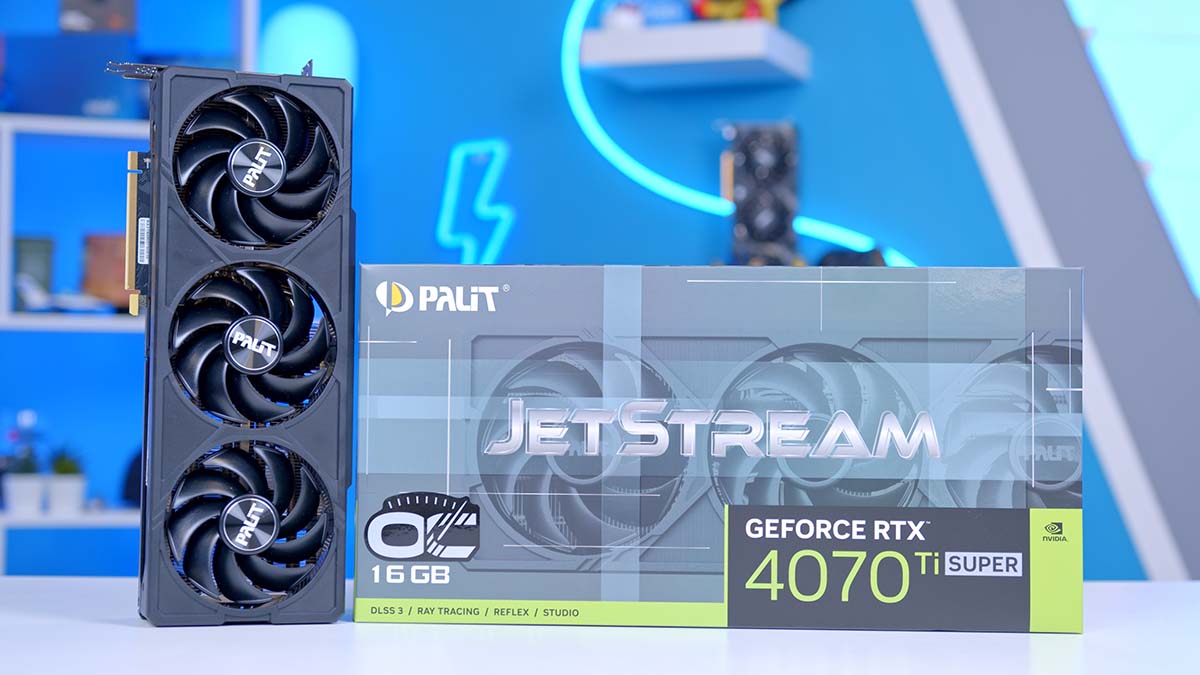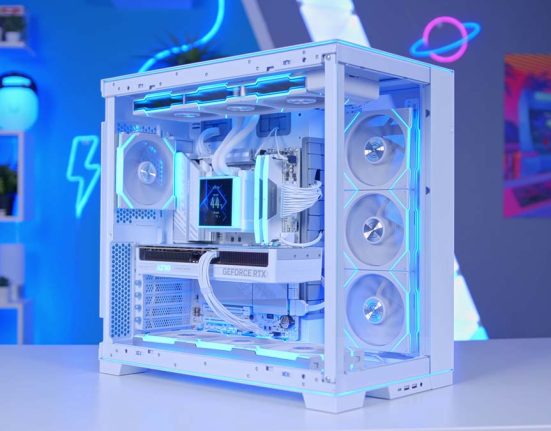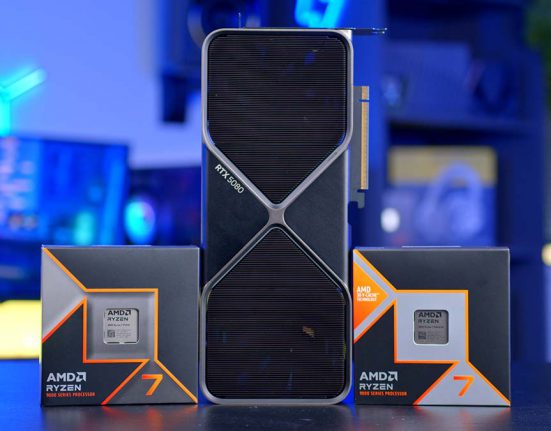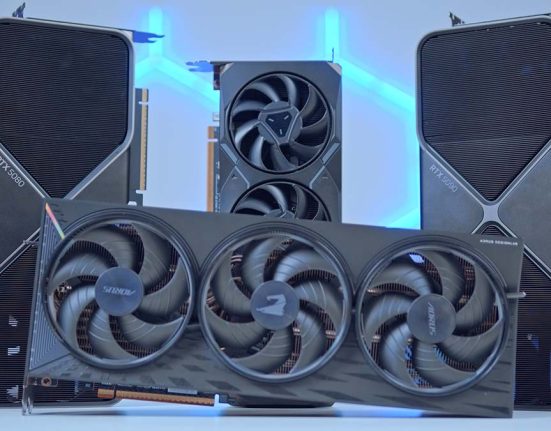Introduction
It’s safe to say that NVIDIA’s RTX 4000 series of graphics cards have been focussed on providing top-tier gameplay at higher resolutions. With the introduction of DLSS 3.0 and Frame Generation, the Ada Lovelace architecture has provided gamers with plenty of reasons to upgrade to a 1440p gaming PC.
But after pricing concerns, as well as some stiff competition from AMD, NVIDIA have opted to develop on the RTX 4000 series by introducing SUPER variants of select cards. The RTX 4070 Ti SUPER is the second card in the new collection of graphics card, arriving just one week after the RTX 4070 SUPER. But does this GPU provides enough of a performance enhancement to justify its place on an already congested market?
To find out, we’ll be looking at Palit’s RTX 4070 Ti SUPER JetStream OC in more detail, including a number of gaming benchmarks in the latest titles. Additionally, we’ll be analysing the performance, appearance, and features of this particular design, to see whether you should consider Palit’s variant of the RTX 4070 Ti SUPER for your next PC build.
Specifications
Looking at the touted performance of the RTX 4070 Ti SUPER, there are a number of key differences compared to the original RTX 4070 Ti. Most notably, the SUPER variant includes an additional 4GB of VRAM, an area that has dominated a lot of the discussion with NVIDIA’s cheaper RTX 4000 series models. However, the total 16GB of video memory on this card is more than enough to support 1440p and 4K gameplay in the latest titles for years to come.
In addition, the RTX 4070 Ti SUPER provides improved clock speeds compared to its predecessor, something which is elevated further on the Palit RTX 4070 Ti SUPER JetStream OC. With speeds of up to 2.64GHz, this RTX 4070 Ti SUPER looks to provide a significant increase in framerates from the original RTX 4070 Ti.
| Specification | Palit RTX 4070 Ti SUPER JetStream OC |
|---|---|
| Video Memory | 16GB GDDR6X |
| Memory Bus | 256-bit |
| Core Clock Speed | 2.34GHz |
| Boost Clock Speed | 2.64GHz |
| CUDA Cores | 8448 |
| RT Cores | 66 |
| Tensor Cores | 264 |
| Power Consumption | 285W |
| GPU Length | 329mm |
| MSRP | $799 |
Another improvement that seems to be a priority from NVIDIA’s standpoint is the increased CUDA cores, RT cores, and Tensor cores. These upgrades all contribute to enhancing the capabilities of DLSS, allowing buyers to experience improved visual fidelity and performance benefits when the technology is enabled.
Looking at the Palit RTX 4070 Ti SUPER JetStream OC specifically, the main benefit to this variant is the aforementioned clock speeds. With an increased boost clock speed of 2.64GHz, instead of the standard 2.61GHz on other designs, Palit’s offering is likely to provide some additional frames per second in select titles.
| Spec | RTX 4070 Ti | RTX 4070 Ti SUPER | RTX 4080 |
|---|---|---|---|
| Video Memory | 12GB GDDR6X | 16GB GDDR6X | 16GB GDDR6X |
| Memory Bus | 192-bit | 256-bit | 256-Bit |
| Core Clock Speed | 2.31GHz | 2.34GHz | 2.21GHz |
| Boost Clock Speed | 2.61GHz | 2.61GHz | 2.51GHz |
| CUDA Cores | 7680 | 8448 | 9728 |
| RT Cores | 60 | 66 | 76 |
| Power Consumption | 285W | 285W | 320W |
| MSRP | $799 | $799 | $1199 |
Suggested Article: How to Build the Best RTX 4070 Ti SUPER Gaming PC
What are RTX SUPER GPUs?
The term ‘SUPER’ doesn’t offer much clarity as to what gamers can expect from NVIDIA’s latest RTX 4000 series GPUs, so allow us to explain. RTX SUPER graphics cards act as a mid-generational refresh that typically provide improvements to the performance, pricing, or design of a previous model.

In the case of the RTX 4070 Ti SUPER, the main focus appears to be on the performance front, as the MSRP is the exact same as its predecessor. Whilst the lack of a Founders Edition makes it hard to know the exact design differences between the RTX 4070 Ti SUPER and the original RTX 4070 Ti, Palit’s RTX 4070 Ti SUPER JetStream OC shares an identical form factor with their previous design, suggesting little has changed.
Out of all the RTX 4000 SUPER variants announced at CES 2024, the RTX 4070 Ti SUPER looks to have received the biggest performance upgrade, mainly thanks to the increased VRAM. On the other hand, the RTX 4080 SUPER is focussed on lowering the price point to compete with AMD’s RX 7900 XTX, whilst the RTX 4070 SUPER adds another 1440p-capable GPU to compete with the RX 7800 XT in the mid-range market.
| Model Name | MSRP |
|---|---|
| RTX 4060 | $299 |
| RTX 4060 Ti 8GB | $399 |
| RTX 4060 Ti 16GB | $499 |
| RTX 4070 | $549 |
| RTX 4070 SUPER | $599 |
| RTX 4070 Ti | $799 |
| RTX 4070 Ti SUPER | $799 |
| RTX 4080 | $1199 |
| RTX 4080 SUPER | $999 |
| RTX 4090 | $1599 |
Design & Aesthetic
Turning our attention towards the Palit RTX 4070 Ti SUPER JetStream OC, this graphics card puts a clear emphasis on performance. However, there are plenty of design choices that will make this graphics card an appealing option for a mid-range PC build targeting high-end 1440p gaming.
Firstly, the all-black design makes the Palit RTX 4070 Ti SUPER JetStream OC is fairly malleable, blending into the aesthetic of most systems with ease. Like most of the RTX 4070 Ti SUPER options available, this card sports a triple-fan layout, leading to optimal cooling.

To support the cooling performance further, this graphics card comes with Palit’s Gale Hunter fans, which provide more concentrated airflow for greater heat dissipation. On top of this, both the GPU plate and VRAM are supported by ultra-wide copper bases to absorb heat and move it away from these vital components.
Though the triple-fan design is great for thermal regulation, it results in this card being 329mm in length, which could cause some issues in terms of case compatibility. The original RTX 4070 Ti faced similar problems, so it is important to check that you pick up a PC case that can house the RTX 4070 Ti SUPER before making the investment.

However, the biggest downside of the Palit RTX 4070 Ti SUPER JetStream OC is the lack of RGB lighting or aesthetic features to make this GPU stand out from the other RTX 4070 Ti SUPER graphics cards. Despite the benefits that this card looks to provide under the hood, lots of gamers are bound to overlook this design, simply because of the lack or kerb appeal.
Performance
Many of the factors we’ve discussed are important aspects to consider, but performance is what truly makes or breaks a graphics card. For the Palit RTX 4070 Ti SUPER JetStream OC, we’d expect to see strong performance at 1440p settings that surpasses the original RTX 4070 Ti, along with small improvements over its non-OC equivalents.
To find out whether the Palit RTX 4070 Ti SUPER lives up to these expectations, our in-house gaming benchmark expert, Harry Coleman, put this card through its paces in all the latest and greatest titles.
Alan Wake 2
Settings: 1440p, Post-Processing High, Texture Resolution High, Texture Filtering High, Volumetric Lighting High, Global Illumination Quality High, Shadow Detail High, Terrain Quality High, Ray-Tracing: Disabled, DLSS: On/Off, Frame Generation: On/Off
In Alan Wake 2 we ran two separate benchmarks, one with ray tracing and DLSS, and one without. With DLSS and ray tracing switched off the RTX 4070 Ti was able to offer around 85FPS on average, which was more than playable. Alan Wake 2 is quite demanding, which is why framerates are slightly diminished, but the 85FPS we saw was still quite strong regardless.
With ray tracing and DLSS enabled, framerates jumped up to 119FPS. DLSS is clearly putting in some work here, but its great to know that performance still holds up while ray tracing is switched on.

Starfield
Settings: 1440p, Shadow Quality High, Indirect Lighting High, Reflections High, Crowd Density High, Particle Quality High, Volumetric Lighting High, Motion Blur off, GTAO Quality High, Grass Quality High, Contact Shadows High VSync Off, DLSS/FSR OFF
In Starfield at 1440p high settings, the RTX 4070 Ti SUPER was able to output 98 frames on average. Ultimately, Starfield is quite a demanding title, and even some of the strongest cards on the market aren’t able to offer more than 100FPS. Regardless, gameplay was stable across the runs that we did, and the RTX 4070 Ti SUPER held up within this title.

Cyberpunk 2077
Settings: 1440p, Shadow Quality High, Indirect Lighting High, Reflections High, Crowd Density High, Particle Quality High, Volumetric Lighting High, Motion Blur off, GTAO Quality High, Grass Quality High, Contact Shadows High VSync Off, DLSS/FSR: On/Off, Ray Tracing: On/Off, Textures: High
In Cyberpunk 2077 with DLSS and ray tracing enabled, the RTX 4070 Ti SUPER hovered around the 100FPS mark, which was very reasonable considering visual fidelity is significantly increased with ray tracing here.
When we turned off these settings framerates improved marginally, with the RTX 4070 Ti SUPER sitting just above the RX 7900 XT offering an average of 124FPS. Again, performance was more than reasonable here and matches up well against current market alternatives.

Hogwarts Legacy
Settings: 1440p, Shadow Quality High, Indirect Lighting High, Reflections High, Crowd Density High, Particle Quality High, Volumetric Lighting High, Motion Blur off, GTAO Quality High, Grass Quality High, Contact Shadows High VSync Off, DLSS/FSR: On/Off, Ray Tracing: On/Off, Textures: High
In Hogwarts Legacy, the RTX 4070 Ti SUPER sat at 117FPS, placing it just below the RTX 4080. The RX 7900 XT is hot on the heels of the RTX 4070 Ti SUPER, losing out to the SUPER card by only 2 frames. Admittedly the difference here would be entirely negligible, but the RX 7900 XT is clearly a strong competitor versus the RTX 4070 Ti SUPER.

COD Warzone
Settings: 1440p, Upscaling/Sharpening FSR 2.1/DLSS Quality (80 Sharpness), Texture Resolution High, Texture Filter Anisotropic High, Level of Detail High
In COD Warzone at 1440p with DLSS enabled, the RTX 4070 Ti SUPER yet again cements itself as a strong performer, offering 173FPS on average. Beating out the RX 7900 XT, and coming close to the RTX 4080. Warzone is a game where framerates really matter, so with the RTX 4070 Ti SUPER offering very strong performance here, its a solid contender for buyers looking to max our framerates within popular FPS titles.

F1 2022
Settings: 1440p, Ray Tracing Quality Medium, Lighting Quality Ultra High, Post Process High, Shadows Ultra High, Weather Effects Ultra High, Ambient Occlusion HBAO+, Asynchronous Compute On, Texture Streaming Ultra High, Anisotropic Filtering 8x, DLSS: Enabled
In F1 2022 at 1440p ultra high settings, the RTX 4070 Ti SUPER offered a whopping 284FPS on average. Admittedly, the vast majority of mid-range cards also offered very strong performance, but the RTX 4070 Ti SUPER demonstrates its legs within ray traced titles, which is equally impressive.

Apex Legends
Settings: 1440p, Anti-aliasing TSAA, Texture Filtering 8X, Model Detail High, VSync Disabled, Effects High, Ambient Occlusion Quality High
In Apex Legends at 1440p high, the RTX 4070 Ti SUPER sits towards the top of the graph yet again, with an average of 256FPS. The performance we saw with this card was very smooth, and indicates how well NVIDIA GPUs can perform within optimised titles.

Fortnite
Settings: 1080p, Quality Low, Anti-aliasing & Super Resolution TSR High, Temporal Super Resolution Performance, View Distance Far, Textures Low
In Fortnite we dialled the resolution back to 1080p, and changed the settings to Competitive mode. This gives us an indicator of how high performance can fly when there’s no restrictions. The RTX 4070 Ti SUPER was able to output 315FPS on average in this title, which is more frames than you’ll ever need within a competitive title.

Cost Per Frame
Raw performance is a key metric that we use to assess how good a graphics card is, but cost per frame is also a valuable measurement used to see exactly how much you’re spending per frame on average. We’ve provided two sets of graphs below, analysing the cost per frame in both Apex Legends and Hogwarts Legacy.
Apex Legends
In Apex Legends our cost per frame for the RTX 4070 Ti SUPER sat at $3.12, placing it towards the top of the graph just above the RX 7900 XTX. The RTX 4070 Ti SUPER isn’t looking particularly cost efficient within this graph, primarily due to its $799 MSRP. Because Apex Legends doesn’t require the best graphics cards money can buy to reach high framerates, perhaps a cheaper card is worth considering for this particular game.

Hogwarts Legacy
In Hogwarts Legacy the graph does shift slightly, with the RTX 4070 Ti SUPER offering slightly better value than AMD’s RX 7900 XT. Because Hogwarts Legacy is a much more demanding title in comparison to Apex Legends, the cost per frame is slightly better. You are able to leverage higher framerates (as seen within our benchmarks), but the $799 MSRP is the biggest caveat. And with this Palit variant that we’re taking a look at today, the cost per frame only worsens.

RTX 4000 SUPER or RTX 5000?
With the release of the RTX 4000 SUPER, a lot of PC gaming enthusiasts have questioned if it’s the right time to upgrade their graphics card. This is mainly due to a number of rumours suggesting that NVIDIA’s RTX 5000 series (codenamed ‘Blackwell’) could release as early as Q4 of 2024, leaving gamers to weigh up whether the wait is worth it.
Normally, a new generation of graphics cards will provide a more significant boost to performance, as these designs will likely come with brand-new architecture and a new iteration of DLSS. As a result, the thought of a new generation of NVIDIA GPUs on the horizon is bound to make a lot of gamers skip the RTX 4000 SUPER series and wait patiently for more details on RTX 5000.

That being said, we have yet to receive any concrete evidence that the RTX 5000 series are on the way. Furthermore, the launch of RTX 4000 SUPER would have only delayed any possible announcements from NVIDIA themselves, making a 2024 release appear less likely.
On top of this, the arrival of RTX 4000 SUPER has made the market the most competitive it has been in years, which is reflected in the pricing. With multiple price drops already to both NVIDIA and AMD’s offerings, now appears to be a good time to pick up a GPU. Because of this, we wouldn’t advise putting all of your chips on RTX 5000, as it is too early to know what to expect in terms of pricing and performance.
Conclusion
Palit RTX 4070 Ti JetStream OC
Product Name: RTX 4070 Ti
Brand: Palit
-
Features
-
Design
-
Performance
-
Value For Money
Summary
Overall, Palit’s RTX 4070 Ti SUPER JetStream OC is a great option for gamers looking to build a mid-range gaming PC that excels in 1440p settings, whilst also having plenty of firepower to run the latest AAA narratives. Additionally, this graphics card offers a significant improvement to gaming performance when compared to its predecessor and other RTX 4070 Ti SUPER GPUs.
That being said, the increased performance comes at the cost of the design, which boasts a less than inspiring all-black look that acts as a safe but simple option for gamers to consider when building their next PC. As for the RTX 4070 Ti SUPER on the whole, the DLSS integration and enhanced performance makes this graphics card a better contender than the original RTX 4070 Ti. However, it lacks the convincing results and value to make it the clear choice within a very packed 1440p gaming market.
Pros
✅ 1440p gaming
✅ Thermal regulation
✅ Boosted performance
Cons
❌ Bulky size
❌ Simplistic appearance
❌ Value for money




![FI_[DM82] TT MineCUBE Build](https://geekawhat.com/wp-content/uploads/2025/12/FI_DM82-TT-MineCUBE-Build-551x431.jpg)



